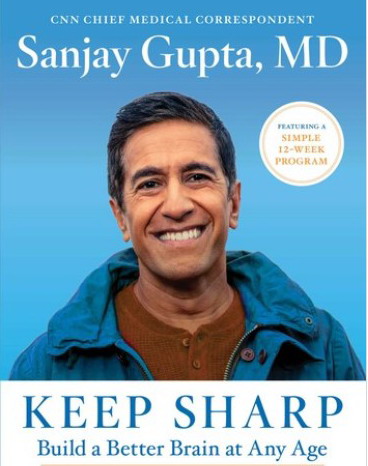
As we begin a new year, rather than talk about resolutions and tips for keeping them as I have done over the past many years, I decided to do something different. Upon turning 72 today, I decided to celebrate by sharing some new and truly significant research with you (especially for those older folks like me) about how to keep your brain young and to fight off dementia.
My inspiration and source for this segment is CNN’s chief medical consultant and neurosurgeon Sanjay Gupta, M.D. and his new book Keeping Sharp . In it, Dr. Gupta provides not only a concise summary of practical information of how to stay mentally sharp but also offers new data which suggests lifestyle changes which can help fend off dementia and even reverse some of its effects. Here is a summary that I hope will get your new year off to a great start . Happy New Year ! 
1- EXERCISE It is important to know that what is good for the heart is also good for the brain. Having a strong blood flow and supply to the brain is vital to having a healthy brain. Staying active and engaging in 30 minutes of sustained movement such as brisk daily walk can make significant improvement in not only cardiac but also mental and brain health as well.
2 – DIETS RICH IN BERRIES AND MODERATE IN ALCOHOL You probably already know that menus which are low in animal fats and meat and high in fruits and vegetables are good for your heart. What new research has shown is that berries have a special nutrients (flavanols and anthocyanins) which are especially good for brain health because of their anti-oxidant, anti-inflammatory and anti-aging properties.
It should also be stressed that the research regarding cognitive impairment and chronic heavy drinking is well established. Despite the White House’s recent rejection of the scientific advisory panel’s recommendation to revise its definition of moderate drinking from two to one alcoholic drink per day, the science is clear.
3 – LEARNING NEW SKILLS An important way to protect the brain is to challenge it with new and unaccustomed activities. Trying something out of your comfort zone creates new neural connections and pathways. Learning a new mental skill such as a foreign language or physical skill like dancing are good examples of activities which which keep the brain young and growing.
4 – SLEEP The importance of a good night’s sleep is well documented for contributing to a strong immune system and for fighting stress. Being well rested is also an important element in brain health because it’s the time when memory files are created and preserved. The healthy creation of new memory files is crucial for better recall and normal brain functioning and mental flexibility.
5 – SOCIAL INTERACTION Finally, avoiding social isolation and regularly participating in meaningful and satisfying social interaction with friends and family is essential for optimum brain health. The love , acceptance and empathy that we experience when we relax and enjoy time with people not only lowers the level of stress hormones in our body which damage the brain but it also causes the release of neurotrophins which is the ultimate nutrient for the brain.
Oh … one more thing. Be careful ( … and I know that you won’t want to hear this) with over-using non steroidal inflammatory drugs (NSID) like Advil. There is significant research which links cognitive impairment with long term use.
That’s it. Having a healthy brain isn’t that complicated or that difficult. Remember and put into practice these five tips and you will be surprised how much better you feel and how much calmer about aging you will be*.
Rev. Michael Heath, LMHC, Fellow AAPC January 3rd 2021
- If you are older and have been worrying about memory lapses, please don’t hesitate to discuss them with your doctor. It is important to know that most things like forgetting like where you put your keys or forgetting someone’s name are quite normal consequences of your brain’s processor slows down. Likewise anxiety and increased distractibility can often be the cause.


